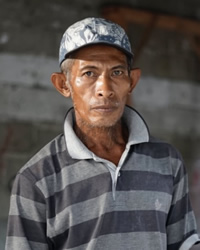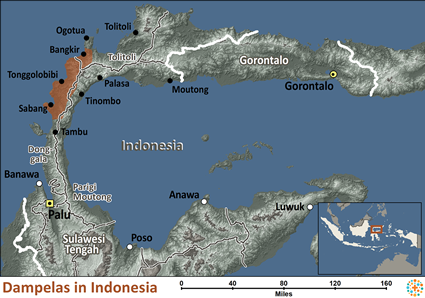The Dampelas live in the Damsol district (Dampelas Sojo), in the Buol regency in Central Sulawesi. Their area on the northwestern peninsula of Sulawesi is bounded by the straits of Makassar to the west, Tomini District to the east and south Dampal district to the south. The Dampelas language is like the language of Tomini. The word Dampelas originated from the words dampe and las. The word dampe means "seed" or "ancestry". The word las is used as an abbreviation of the word Ihlas, which was the name of the first king who ruled in this area. Therefore, "Dampelas" means those who are descended from the line of King Ihlas. Before the Dutch entered, this area was a small kingdom under the rule of King Banawa. The Dampelas language is part of a larger linguistic grouping called the Southern Tomini subgroup which also includes the Balaesang, Pendau, Taje and Tajio languages.
Most of the land is mountainous and is used for agricultural purposes. However, in the interior areas, the forest is still virgin. The jungle is noted for its harvest of rattan, lumber and resin. The major commodities of the area that are exported to other islands are: copra, cloves, rattan and resin. Traditional handicrafts include woven silk and crafts made from cloves exclusive to Toli-Toli. The Dampelas make their living primarily as hunters, farmers and craftsmen. As a result of their farming methods, they are frequently forced to move as they do not use methods that keep the soil fertile. When the land begins to produce a poor crop, they move to look for a more fertile area.
The Dampelas have been Muslim for generations. Many of them are proud of their Islamic identity and devoutly seek to follow the five pillars of Islamic practice. However, many of them still hold to traditional animistic beliefs, such as belief in powerful spirits and sacred places. These sacred places are believed to give protection to people. They also function as places where it is possible to ask for special blessings in accordance with following certain customs. The Dampelas use weapons or amulets with supernatural powers to thwart enemy attacks. People who use these weapons are said to become "tough skinned" to be invulnerable to knives and other weapons. Many seek the help of a dukun (shaman/healer/occultist) to prevent sickness or to exorcise evil spirits. The Dampelas believe that their forefathers were Tomanoru. These beings from heaven could incarnate themselves in certain plants and one of these incarnated plants became a man. One of the Dampelas traditions is the mogupa ceremony. This ceremony is a blend of cultural and Islamic elements. It is performed as a means of honoring those who have died. Moguto buwiyan is a ceremony to exorcise epidemics or serious illness. Other life cycle ceremonies include the monilam (circumcision) and malead (the teenagers' teeth are filed as a sign of becoming adults).
Currently, medical help is needed, as the standard of healthcare in the area is poor. The Dampelas also need technical assistance and training to increase the yield of their harvests. This in turn would increase their standard of living, which remains relatively low.
Pray for the Dampelas elders to have dreams and visions of the risen Christ, opening them to the only savior.
Pray for Dampelas disciples to make more disciples.
Pray for workers.
Scripture Prayers for the Dampelas in Indonesia.
IPN, 2011 Copyrighted © Used with permission.
| Profile Source: Joshua Project |

























